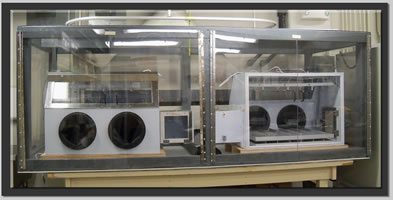
Microbially Induced Concrete Corrosion (MICC) is a process of concrete degradation typically associated with wastewater treatment and conveyance infrastructure. Bacteria of the species Thiobacillus occur naturally in municipal wastewater and take up residence on the surfaces of pipes, tanks, vaults, and other exposed concrete elements. Under the right environmental conditions, Thiobacillus produce sulfuric acid that corrodes concrete at a rate that can significantly reduce design life or even cause failure of these elements.
The MICC research team at Purdue is focusing on identifying the relationships between environmental conditions, biological activity, and material properties in instances of MICC. Two fully automated environmental chambers have been constructed to evaluate the performance of carefully selected concrete mixture designs exposed to accelerated MICC conditions. Additionally, relationships between field and laboratory conditions are being assessed in an effort to provide test methods that accurately represent concrete susceptibility to MICC. The results of this research will further the understanding of the fundamental mechanisms of MICC and ensure that concrete remains a part of sustainable wastewater conveyance and treatment infrastructure design.